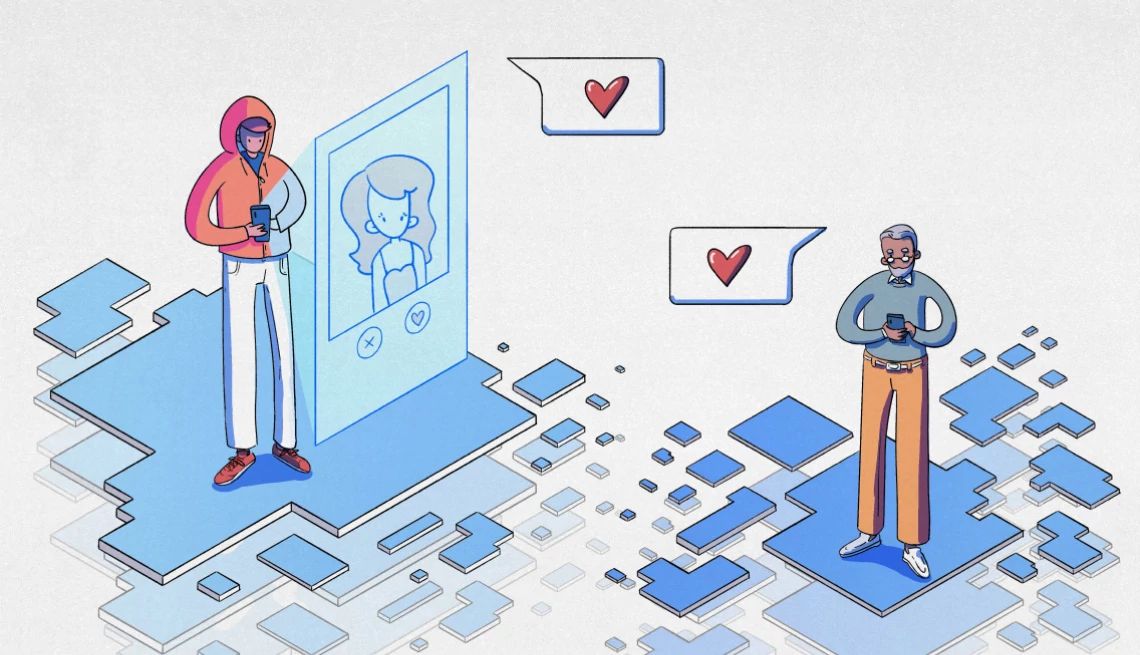AARP Hearing Center


Read the wedding announcements in any newspaper and there’s sure to be at least one couple who tells of meeting through an online dating site. But seeking romantic bliss in the cyberworld can have a major downside: Scammers are eager to take advantage of lonely hearts. Losses from romance scams reported to the Federal Trade Commission (FTC) in 2023 totaled $1.14 billion, the highest for any form of imposter scams. (Actual losses are surely far higher, as scams are notoriously underreported crimes.)
False Romeos and Juliets are not just confined to dating sites, however. Criminals also target potential victims in messages through Facebook and Instagram; 40 percent of people who told the FTC that they’d lost money in a romance scam in 2023 reported it started on social media.
What sets romance scams apart from other scams, says Mark Solomon, president of the International Association of Financial Crimes Investigators, is that instead of an urgent appeal for immediate payment, as occurs with IRS imposters and many other schemes, the criminal moves slowly. They will communicate many times, he notes, sometimes over a span of weeks or months, to gain the victim’s trust “and make an emotional connection."
Whatever your interests and experiences, the scammer will mirror them. Have you just lost a spouse? So have they. Have you had some health problems? They have a treatment idea. “Immediately they have the attention of the victim,” says Petros Efstathopoulos, vice president of research at RSAC, which provides conferences, insights and education for global cybersecurity experts. Creating that kind of intimate connection “is scamming 101 and it’s super effective.”
Their goal is to steal everything they can from you. ”Then when they do take everything, … they'll transition the victim into being their money mule,” says Solomon; they’ll rope you into helping them steal from their next victim.
How to spot a romance scam
To avoid placing your trust in the wrong person, pay close attention to these red flags.
- A ‘wrong number’ text. If you reply, you’ll soon find yourself in conversation with them. “All of a sudden, they create a relationship out of thin air,” says Solomon.
- They want to talk to you directly. If you met on a dating site, they’ll quickly ask for your number, or ask you to communicate through WhatsApp or another messaging platform. “They want to take you off those sites because those companies have the ability … to identify fraudsters and block them,” says Solomon.
- They live far away. You can’t meet in person — yet — because they claim to live in another part of the country or to be abroad for business, a military deployment or charity work.
- They are constantly in contact. They love bomb you — lavish you with attention —texting first thing in the morning and last thing at night and promise a life together.
- You make plans to meet, but something always comes up. Just as they’re on their way to meet you at last, there’s a last-minute crisis.
- They need money for an emergency. Your online companion has a sudden medical problem, legal crisis or business disaster; they need money fast and you’re the only one who can help.
- They have an investment opportunity. They have a relative who’s done well in cryptocurrency and they want you to benefit from their knowledge.



































































More From AARP
What You Need to Know to Protect Yourself Against Bank Scams
It can be hard to tell whether you’re being contacted by your bank or a criminal
It Can Be Agony When a Loved One Is a Scam Victim — But Refuses to See It
Some chronic fraud victims deny that they’ve been targeted by scammers, frustrating the people who care about themMake Your Smartphone’s Files Invisible to Prying Eyes
Secret folders that you can lock and unlock — or even hide and unhide — can conceal sensitive apps, documents, files, photos and video